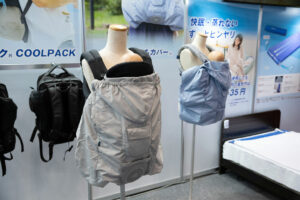AS EXTREME heat blankets the globe from Phoenix to Athens, entrepreneurs are responding with an array of personal cooling devices that can help reduce health risks for everyone from infants to outdoor workers.
At Tokyo’s annual Extreme Heat Countermeasures Exhibition last week the focus was on how to keep workers in high-temperature environments, like construction sites and factories, cool and reduce the risk of heat stroke. As fossil fuel emissions accelerate climate change and with July set to become the world’s hottest month on record, there is growing appetite for the products from consumers and public institutions.
“We’re getting more orders from public facilities, like school gyms, to use our product,” said Hayato Ohashi, who works in sales at industrial fan manufacturer Earth Blower Japan, Inc. “The heat is just getting extraordinary in the last decade — it’s not something that will suddenly disappear next year.”
Japan has one of the world’s oldest populations and its citizenry is particularly at risk from extreme temperatures. In 2020, 86% of heat wave deaths were among people above the age of 65, according to the environment ministry. And Japan isn’t the only country aiming to safeguard people: last week US President Joseph R. Biden said the nation is spending $100 billion a year to protect Americans from extreme heat.
Here are the top cooling products showcased at the trade show in Tokyo.
BABY CARRIERS, BEDS
Tokyo-based Kuchofuku Co. has been making fan-equipped apparel like vests and jackets favored by many Japanese construction workers for decades. The company has redesigned some of its products as casual wear and home products for general consumers.
Fan-based cooling apparel works by accelerating airflow to dry perspiration and typically uses less energy than air-conditioning. The approach works best in more humid places where perspiration doesn’t evaporate efficiently.
Kuchofuku’s offerings included a fan-equipped baby carrier and a bed. The mattress, which is made of a sheet of flexible, mesh-like padding, has an electricity-powered fan at the foot that sucks air from the headboard to boost circulation and keep sheets dry. The baby carrier fans are battery powered.
LARGE-SCALE FANS
Earth Blower Japan produces large-scale fans nearly 2 meters (6 feet 6 inches) tall that blew visitors passing its booth with a strong breeze. Fans come in a variety of models, with names of Japanese deities, like thunder god “Raijin” or wind god “Fujin Max.”
Mr. Ohashi emphasized the flexibility that fans offer because they can easily be transported to new locations and provide immediate relief. Although factories and logistics centers are the regular customers, the company has also rented out its blowers for use at stadiums, including for some of the sporting events during the Tokyo 2020 Olympic Games.
Fans can also limit power costs. Although expenses vary according to the cost of electricity, Ohashi said running its biggest fan for eight hours a day for a month excluding weekends typically only costs around ¥10,000 ($72).
SAFETY HELMETS
Many of the products on display targeted outdoor workers. Because of Japan’s aging population many of its laborers at construction sites or in agriculture are at higher risk of heat stroke.
Hyogo prefecture-based Toyo Safety Industrial Co. showcased a safety helmet with a fan installed at the base that circulates air around the wearer’s head. The fans that are detachable and rechargeable.
WEARABLES
Tokyo-based Biodata Bank, Inc. has developed a wearable device that alerts people when they are at risk of heatstroke.
Its Heat Warning Watch Canaria beeps when the wearer’s core body temperature exceeds unhealthy levels. Priced at ¥4,950, the watch can be used for four months without charging. The device is aimed at outdoor workers and athletes.
The product is currently sold in Japan and Europe, and the company has seen demand increase in European countries amid heat waves in recent years.
FOR PETS
Some firms are eyeing products for four-legged animals.
Manufacturer A-Mec Co. developed a mesh vest with pockets to carry cold packs for dogs to keep pets cool in hot weather. The vests, which come in four sizes and range in price between ¥4,950 and ¥7,150, are also sold in the US market.
Businesses have become increasingly aware of demand for animal cooling products, and retailers like Sweet Mommy also offer fan-based cooling vests for pets. — Bloomberg

